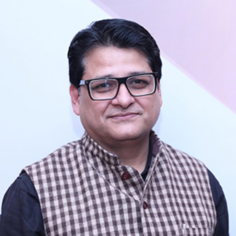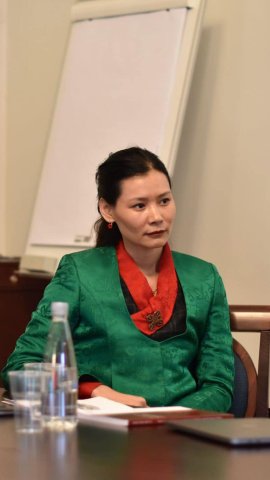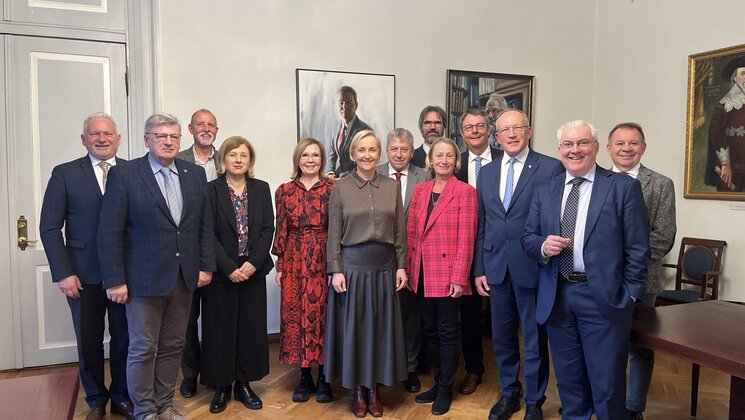Conference on Engaging with India in a Multi-Polar World

India's rise as a global power has profoundly transformed both its domestic and international roles, creating unique opportunities to explore the intersections of national ideologies, multiculturalism, and emerging partnerships. The conference seeks to investigate on how India's socio-political changes, rooted in its multi-ethnic and multicultural fabric, influence its domestic policies and international relations.
In 7-8 May 2025 we aim to analyze the impact of India's ascent on global geopolitics, particularly regarding its evolving relationships with smaller states like Estonia, Latvia, and Lithuania.
Key topics for discussion include:
- India and the Baltics in Global Geopolitics: How do the Baltic states engage with India within the European Union’s Indo-Pacific strategy, and how might the upcoming India-EU Free Trade Agreement strengthen economic ties?
- Technology and Trade: What opportunities exist for partnerships in digital governance, pharmaceuticals, and renewable energy? How can Estonia’s digital leadership complement India’s initiatives?
- Cultural and Historical Connections: How do shared Indo-European roots and the contemporary exchange of Indian cultural practices enhance cross-cultural understanding?
- National Ideologies and Multiculturalism: How has India’s policy of multiculturalism evolved, and what lessons can be learned for broader global contexts?
- Geopolitical Challenges: How do India’s relationships with Russia and its non-aligned stance on the Ukraine war affect its engagement with the Baltics and the European Union?
Register and submit your abstract here
Please also note the abstract deadlines:
Submission of Abstract: March 20, 2025
Acceptance/Rejection Notification: the latest on April 15, 2025
CONFERENCE PROGRAMME:
Wednesday, 7th of May
15:00 Gathering
15:10 Welcome Address from Elo Süld, the Head of Asia Center & Ajaneesh Kumar the India Ambassador to Estonia
15:30-17:00 1st Keynote Speaker and Discussion
17:00 Reception in the Restaurant Ülikooli Kohvik
Thursday, 8th of May
9:00-11:00 Panel 1: India’s Position in the Global World Order: Historical and Cultural Ties with Contemporary Engagements
11:00-11:30 Coffee break
11:30-12:30 2nd Keynote Speaker
12:30-14:00 Lunch
14:00-16:00 Panel 2: AI, Ethics, and Environmental Diplomacy
16:00-16:30 Coffee break
16:30-18:30 Panel 3: Security, Foreign Policy, and Strengthening Global Relations
18:30-19:00 Conclusion and Thank You Address
19:00 Farewell Dinner
The Baltic states' alignment with the European Union’s Indo-Pacific strategy highlights their increasing engagement with India as part of broader efforts to “derisk” from China while exploring alternative partnerships. Although the India-Baltic connection is still in its early stages, it offers rich possibilities for collaboration in areas such as trade, technology, sustainability, security and shared values like democracy and digital governance.
Additionally, historical connections rooted in shared Indo-European linguistic and cultural ties, particularly evident in Latvian and Lithuanian languages, complement modern Indian influences, such as yoga, meditation, and Buddhism, particularly in Estonia. Simultaneously, this conference critically examines the internal challenges and ideologies that shape India's nation-building approach. It will focus on exploring these emerging partnerships, addressing the historical and cultural connections, examining opportunities in technology and trade, and critically assessing the geopolitical challenges that shape India-Baltic relations within the broader context of EU-India dynamics and the evolving global order.
With its vast linguistic and cultural diversity, India serves as a living laboratory for exploring the tensions and synergies between local and national identities, the accommodation of ethnic and religious pluralism, and the development of inclusive policies.
Organisers:
Asia Center, University of Tartu
Center for Oriental Studies, University of Tartu
The Embassy of India, Tallinn
Conference keynote speakers in alphabetical order

Kristina Garalytė
Associate Professor and researcher at the Institute of Asian and Transcultural Studies at Vilnius University
She got her PhD in Social Sciences (Cultural Anthropology) at Vytautas Magnus University in 2016, with a dissertation titled Dalit Student Movement in India: From Identity Politics to Counter Culture Movement. Garalytė specializes in South Asian anthropology and cultural area studies. Her research centers on social and political phenomena in India and South Asia, with a particular focus on caste-based social inequality and Dalit movement. She also explores connections between South Asia and Lithuania by examining the Indian migrant community in Lithuania and the alternative orientalist religiosity in the late 20th century and contemporary Lithuania. She is involved in two research projects funded by the Research Council of Lithuania: 1) Ethnic, National and Transnational Identities and Geopolitical Attitudes of Third-country Nationals in Lithuania in the Context of the War in Ukraine and 2) Alternative Religiosity in Soviet and Post-Soviet Lithuania: Orientalist Religious Movements and their Features, Manifestations and Transformations.
Garalytė co-edited a special issue of South Asia Multidisciplinary Academic Journal titled Student Politics in South Asia, a special issue of CASTE: A Global Journal of Social Exclusion titled Historical and Contemporary Anti-Caste Utopias: A Dalit Bahujan Discourse, and an edited volume Anthropology: A Humanistic Science (Vilnius University Press).
In addition to her research, Garalytė is teaching both undergraduate and master’s level courses. Her teaching portfolio includes Anthropology of South Asia, Area Studies and Research, and Social Movements in Asia. From 2018 to 2024, Garalytė served as the Director of the Institute of Asian and Transcultural Studies at Vilnius University. Since 2024, she has been leading the Vilnius University Asian Studies Program Committee.

Harsh V. Pant
Vice President – Studies and Foreign Policy at Observer Research Foundation, New Delhi
Professor Harsh V. Pant is a Professor of International Relations with King's India Institute at King’s College London. He is also Director (Honorary) of Delhi School of Transnational Affairs at Delhi University.
Professor Pant has been a Visiting Professor at the Indian Institute of Management, Bangalore; a Visiting Professor at Banaras Hindu University, Varanasi; a Visiting Fellow at the Center for the Advanced Study of India, University of Pennsylvania; a Visiting Scholar at the Center for International Peace and Security Studies, McGill University; a Non-Resident Fellow with the Wadhwani Chair in US-India Policy Studies at the Center for Strategic and International Studies, Washington, DC; and an Emerging Leaders Fellow at the Australia-India Institute, University of Melbourne.
Professor Pant's current research is focused on Asian security issues. His most recent books include India and Global Governance: A Rising Power and Its Discontents (Routledge), Politics and Geopolitics: Decoding India’s Neighbourhood Challenge (Rupa), America and the Indo-Pacific: Trump and Beyond (Routledge), New Directions in India’s Foreign Policy: Theory and Praxis (Cambridge University Press), India’s Nuclear Policy (Oxford University Press), The US Pivot and Indian Foreign Policy (Palgrave Macmillan), Handbook of Indian Defence Policy (Routledge), and India’s Afghan Muddle (HarperCollins).
Professor Pant writes regularly for various Indian and international media outlets including the Japan Times, the Wall Street Journal, the National (UAE), the Hindustan Times, and the Telegraph.
CONFERENCE SITE
All sessions take place in the University of Tartu Faculty of Arts and Humanities. Please enter from the main entrance (the darker brown section on the photo), take a few steps up the stairs and you will find the conference room at your left.
Street address Lossi 3, Tartu.

WELCOME RECEPTION
The welcome reception takes place in Ülikooli Kohvik restaurant that is located in the historic building next to the University of Tartu main building.
Street address Ülikooli 20, Tartu.

ARRIVING TO TARTU
There are several options to arrive in Tartu.
BY PLANE
Tartu Airport (15 min drive, 10 km from Tartu city centre).
Tartu Airport has Helsinki-Tartu flights. From the airport, there is a special Airport Shuttle, an Express bus No. E1 operating between Tartu Airport and Tartu City. Detailed timetables and stops are provided here.
Lennart Meri Airport in Tallinn (2 hours drive, 176 km from Tartu)
Tallinn Airport has direct air links to numerous cities. To travel from Tallinn airport to Tartu there is a choice between a bus and a train. You can board the Tallinn-Tartu line from the Tallinn airport for a bus, or from Ülmiste stop for train. Tickets can be bought online and downloaded to a smartphone.
Riga Airport in Latvia (3.5 hours drive, 253 km)
There is a special bus line from the Riga Airport in Latvia to Tartu Coach station that we’d recommend. It is operated by the Lux Express company, and the direct link to their ticket platform is here. Please make sure the selected stops are Riga Airport and Tartu Coach Station.
BY BUS
Tartu bus station is a few minutes walk from the conference venue. All bus tickets can be purchased on the Tpilet website and bus station ticket offices. Tickets can be purchased in advance for 10 to 180 days, depending on the bus company. Please note that arriving at the bus station is advisable 15 minutes before departure. If you are arriving by plane via Lennart Meri Airport in Tallinn, there is also a bus stop at the airport “Tallinn Airport”.
BY TRAIN
To travel from Tallinn to Tartu there is also an option for a train. You can board the Tallinn-Tartu train bus either from “Balti jaam” or “Ülemiste” (type the name for the departure), and the destination will be Tartu. Tickets can be bought online and downloaded to a smartphone.
BY FERRY
Information about the sea connections with Tallinn can be found on the Port of Tallinn page. Please make sure that the selected destination is Tallinn. From the port, there is a convenient 20 min walk to Balti jaam train station to catch a train to Tartu.
HOTELS
You will find a large variety of nice hotels and other places to stay in online booking sites. The venue is located in the University of Tartu. Address: Lossi 3, Tartu, Estonia. For all the presenters and keynote speakers we have booked rooms in Dorpat Hotel.







